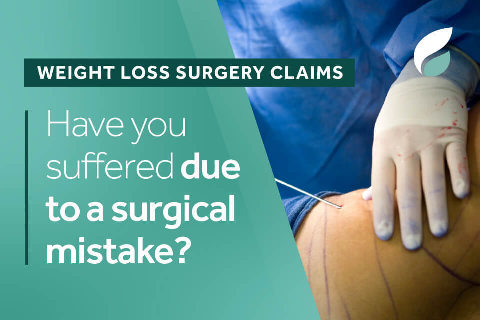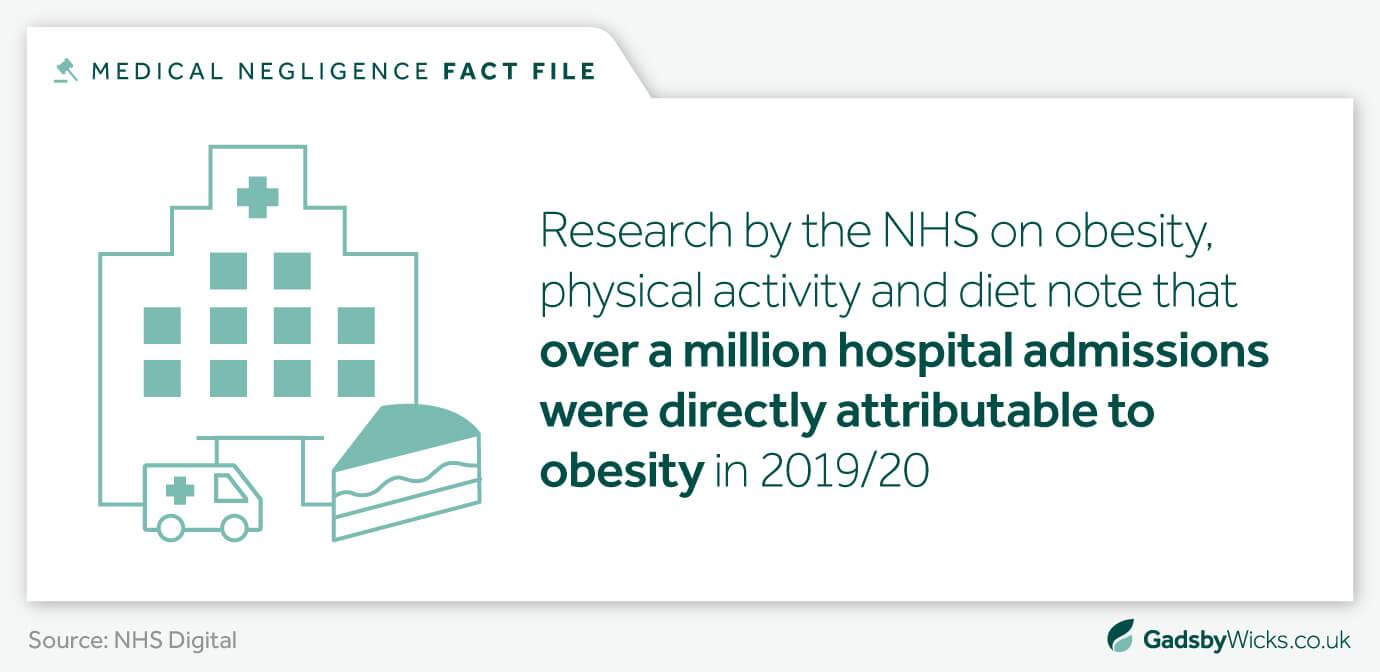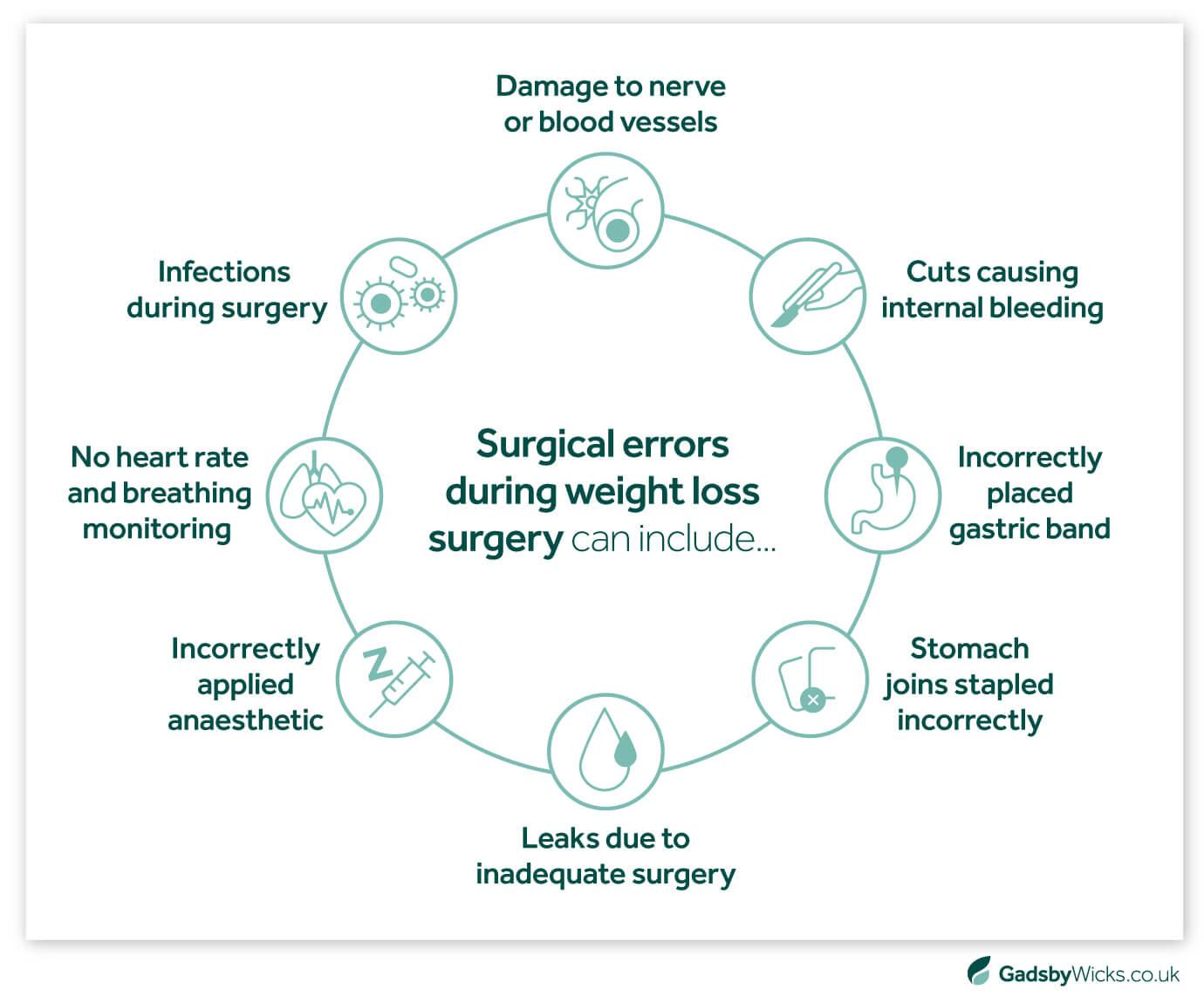- Home >
- Surgical Negligence Claims >
- Weight Loss Surgery Claims
Weight loss surgery is designed to help people towards a healthier lifestyle. When something goes wrong, it can do the exact opposite, placing your long-term health and wellbeing in serious jeopardy.
If this has happened to you or someone you love, our weight loss surgery claims solicitors can help you secure much-needed compensation and answers. With over 30 years of specialist experience and millions recovered in compensation, we are the team you can trust to fight for your right to justice.

Do you have a weight loss surgery claim?
Weight loss surgery helps people with a high BMI lose weight quickly. This usually goes well, but mistakes can happen. If your surgeon or another professional is responsible for a negligent error, the consequences can be life-changing.
From gastric bands that are incorrectly placed, to damage inflicted on nerves and blood vessels. If you have suffered an avoidable injury, you may be able to make a weight loss claim and pursue the compensation and answers you need to move past this distressing experience.

The specialist weight loss surgery claims solicitors for Essex & East Anglia
Nobody should endure negligent care during a weight loss surgery. Since 1993, we have ensured anyone affected by this finds their path to justice.
Working closely with you and meticulously investigating all evidence, we minimise the stress of making a claim and pursue a settlement that secures your future. With 96% of cases resolved out of court and a firm ‘no win, no fee’ approach, we strive to give you complete peace of mind every step to a successful outcome.
What does our weight loss surgery claims process look like?

A free initial consultation
Call us, request a callback or complete our online form and we’ll assess if you have a valid medical negligence claim.

Funding your claim
Discover the ways we can fund your claim without you paying a penny at any stage of the process.

Investigating evidence
We gather medical records, witness statements and more to learn what happened to you and prove your claim.

Instructing independent medical experts
We work with impartial, experienced medical experts to establish whether your injuries were due to substandard medical care.

Valuing your claim
We assess your health and financial losses to accurately estimate how much compensation your claim is worth.

Presenting your case
We contact the Defendants and the Courts on your behalf to set out your allegations and receive a response.

Negotiating a settlement
We work to achieve a fair settlement for you outside the courtroom – this is how 96% of our cases end.

Preparing for Trial
If we must proceed to Trial, we fully prepare you for what to expect so you receive the right result in court.
FAQs about weight loss surgery claims
What is weight loss surgery?
Weight loss surgery, also called bariatric surgery, is surgery performed on your digestive system to help you lose weight.
These procedures are often performed on people suffering from obesity or who struggle with obesity-related conditions, such as high blood pressure, and have found it impossible to lose weight through other means, such as diet and exercise or prescription diet pills.
What can go wrong during weight loss surgery?
While the overwhelming majority of bariatric surgeries are handled competently, mistakes can and do happen. When a breach of duty of care occurs, it can seriously endanger a patient’s safety and welfare in several ways:
- Damage to nerves and blood vessels
- Internal bleeding caused by poor surgical technique
- Incorrectly placed gastric band
- Stomach joins stapled incorrectly
- Leaks of bile and other fluids
- Improper application of anaesthesia
- Failure to monitor heart rate and breathing
- Infections during surgery
Problems can often be rectified if the patient is monitored correctly. However, this is sadly not always the case, and post-surgery negligence can be just as problematic as the initial mistake. Examples of this include:
- Failure to identify and respond to signs of post-operative infection or malnutrition
- Failure to spot signs of internal bleeding
- Failure to recognise stomach punctures and leaks
- Delayed emergency corrective surgery for an obstruction, which could cause a patient to become septic
- Failure to make someone aware of requirements post-surgery (e.g. failing to provide proper advice about nutrition and vitamin supplements)
If these mistakes are proven to have caused your injuries, our specialist clinical negligence lawyers can help you claim damages.

How do I prove weight loss surgery errors were caused by negligence?
The consequences of poorly performed weight loss surgery or inadequate aftercare can be far-reaching. It could range from requiring additional procedures to correct mistakes and longer recovery times, to complications that affect a person for the remainder of their life. In the worst cases, negligent acts can cost someone their life altogether.
If you or someone you care about has been affected by the negligent actions described above, our weight loss surgery claims solicitors can help you prove you have a claim, and secure the compensation you deserve.
To prove that you have a legitimate compensation claim, it is important to answer three key questions:
- Did a healthcare professional breach their duty of care towards you?
- Did you suffer pain, injury, loss or damage during or following treatment?
- Was the causation of your suffering a direct result of the breach of duty?
To help you answer these, we will assess medical records, witness statements and all available evidence. We will also talk to an independent bariatric surgeon, whose expertise will help us establish whether your surgeon’s actions were negligent, and quantify the settlement you deserve.

View our National and Essex Medical Negligence Statistics post for more industry insight.
How can weight loss surgery claim compensation help me?
The amount of compensation you are entitled to following a weight loss surgery claim will largely depend on how your injuries have affected your life, and can help towards a range of costs:
- Future procedures and treatments
- Loss of earnings
- Annual check-ups and scans
- Ongoing therapies
- Required medication
- Home and vehicle adaptations
- Mobility equipment
- Travel expenses
- Long-term care requirements
In the unfortunate circumstances that surgical complications lead to a patient’s death, their dependents can claim for their pre-death pain, suffering and loss of amenities and for any financial support or services the deceased provided for them.
We investigate all available evidence, including medical records, witness statements and independent medical opinion to determine the amount of compensation you are entitled to.
How long do weight loss surgery claims take to settle?
There is no firm answer to this question – every surgical negligence claim is different, and the time it takes to reach a final settlement will depend on several factors, including:
- The stance taken by the Defendants
- The time it takes to hear back from medical experts
As specialists in weight loss surgery claims, we can ensure that your case will be pursued in the most efficient way possible, and we typically expect a claim to be settled within two to five years.
How long do I have to make a weight loss surgery negligence claim?
In most circumstances, you have three years to make a weight loss surgery claim. However, there are exceptions:
- Claimants under the age of 18 have until their 21st birthday to make a claim
- There is no time limit for a claimant who is mentally incapacitated
We always recommend contacting us even if your claim is made outside the standard three-year window. Every claim is at the court’s discretion, and we will always advise on whether your case is likely to be accepted.
Contact our expert weight loss surgery claims solicitors
If you or a loved one sustained injuries from weight loss surgery and would like to speak to someone about your options, our team is here to listen and advise you on your next steps.

Lexcel accredited medical negligence claims solicitors
We are proud to be a Lexcel-accredited practice. The accreditation is a mark of quality and comes directly from the Law Society.
A recent assessment described us as a “Centre of Excellence” and we continue to operate to the highest standards across all main areas of our field. These include client care, case management, financial management, structure and strategy, people management, risk management, information management and file management.








